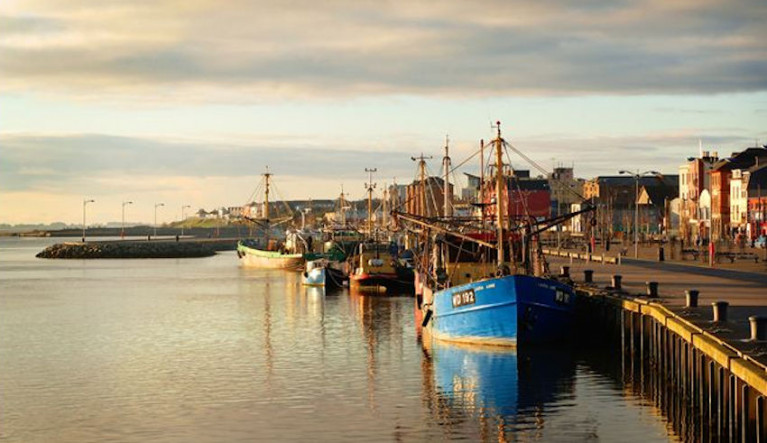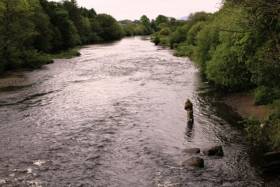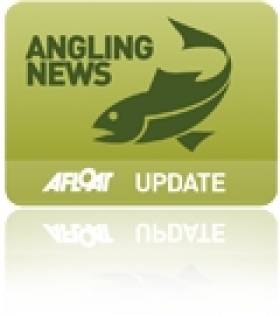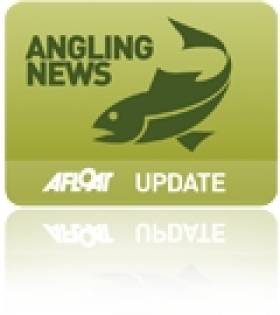Displaying items by tag: River Slaney
Two Men Convicted of Illegal Salmon Angling on River Slaney
Inland Fisheries Ireland (IFI) has secured convictions against two men for illegal salmon angling on the River Slaney in Co Carlow.
The men were each charged with using an illegal method for salmon fishing and failing to produce a licence over the incident in the townland of Kildavin on 15 May 2023.
Dylan Byrne from Hacketstown, Co Carlow, was instructed to pay €700 in fines, and €500 in legal costs. He was also charged with obstruction or impediment of a fisheries officer.
Conor Kavanagh from Carnew, Co Wicklow was fined €350, and directed to pay €500 in legal costs.
The case was heard at Carlow District Court on 7 December 2023.
Commenting after the court verdict, Lynda Connor, South Eastern River Basin District director at IFI said: “The protection of the River Slaney is extremely important to sustain a viable population of wild salmon.
“Illegal angling puts further pressure on this exceptionally vulnerable fish. I commend our fisheries protection officers for their unwavering commitment in protecting this wonderful species.”
IFI encourages members of the public to report illegal fishing incidents, and those of water pollution, fish kills and habitat destruction, to its 24/7 phone number at 0818 34 74 24.
Two Carlow Men Convicted of Illegal Fishing on River Slaney
Two Carlow men have been found guilty of fishing illegally for protected wild salmon on the River Slaney and for obstructing or impeding a fisheries officer, in a prosecution brought by Inland Fisheries Ireland (IFI).
Sitting before Judge Geraldine Carthy at Carlow District Court earlier this month (Thursday 1 December), Shane Rooney of Park Avenue, Phellim Wood in Tullow and Adam Keegan of Slaney View Drive in Tullow were found guilty of all charges against them.
On the evening of 29 March this year, a covert protection operation was carried out by a specialist fisheries unit, supported by local staff. This was at a time of year when wild salmon were extremely vulnerable during the ‘spring run’ up the River Slaney.
In the townland of Kilcarry, on the freshwater portion of the River Slaney, the two defendants were observed illegally fishing for wild salmon during the closed season, using pieces of angling equipment that were contrary to bye-laws.
Rooney was fined €1,500 and ordered to pay a further €750 towards prosecution costs for the three charges against him. These were: obstructing or impeding a fisheries officer contrary to Section 301 (Fisheries Consolidation Act, 1959); using or attempting to use a lure other than artificial fly using single or double barbless hooks, contrary to Bye-law No. 992 of 2021; and using or attempting to use any fish hooks other than single or double barbless hooks contrary to Bye-law No. 989 of 2021.
Keegan, who had pleaded guilty, received a €400 fine in respect of the breach of Article 5(a) of Bye-law No. 992 of 2021 (using or attempting to use a lure other than artificial fly using single or double barbless hooks) and Judge Carthy took the remaining two charges into consideration, which were obstructing or impeding a fisheries officer contrary to Section 301 (Fisheries Consolidation Act, 1959) and assaulting or obstructing fisheries officer contrary to Section 308 (Fisheries Consolidation Act, 1959).
Both men also had their fishing rods and reels seized.
Commenting on the case, Lynda Connor, director of the South-Eastern River Basin District at IFI said: “The River Slaney has an early spring run of wild Atlantic salmon, so these migratory species are especially vulnerable at that time and require as much protection as possible.
“The illegal fishing of wild salmon puts the survival of this protected species into jeopardy, not just in rivers here in the south-east like the Slaney, Nore, Barrow and Suir, but in every Irish river.”
Connor added: “Breaches of fisheries legislation highlight the ongoing issue of illegal fishing activity. At Inland Fisheries Ireland, we have a zero-tolerance approach to serious environmental crime and we initiate prosecutions, where possible. I would like to commend the fisheries protection Officers and their commitment to protecting this vulnerable species.”
New Limits For Wexford Harbour From New Year’s Day
New limits for Wexford Harbour will be set from next Wednesday 1 January, according to the latest Marine Notice from the Department of Transport, Tourism and Sport.
Transport Minister Shane Ross has signed into law the Harbours Act 1996 (Limits of Wexford Harbour) Order 2019 - SI No 625 of 2019.
The statutory instrument defines the new seaward limit of Wexford town’s harbour as an imaginary line drawn from Raven Point to Rosslare Point, and the inward limit at the southern side of the Old Bridge on the River Slaney in Enniscorthy.
This change was made following consultations with Wexford County Council; the Marine Survey Office; Marine Planning-Foreshore Section of the Department of Housing, Planning, and Local Government; Waterways Ireland; and Inland Waterways Association of Ireland.
River Slaney Salmon Ban Angers Gorey Anglers
#Angling - Gorey anglers have expressed ‘outrage’ over the closure of the River Slaney for salmon fishing in 2017, as the Gorey Guardian reports.
Minister of State Seán Kyne said the move was made to help replenish and conserve stocks in the Wicklow and Wexford river, where worms for bait and barbed hooks have also been prohibited for the coming year.
But Slaney River Trust members have hit out at the ban, suggesting that the absence of even catch-and-release fishing for salmon will see angling numbers decline and encourage poaching on what’s a significant resource for the South East.
73 rivers have been approved to open for salmon angling this year, as previously reported on Afloat.ie — though that figure is nine fewer than those opened to full angling or catch-and-release in 2016.
The Gorey Guardian has more on the story HERE.
Country Home On The River Slaney At A Bargain Price
#Property - A mid-Georgian country house on 50 acres in Co Carlow with its own angler's chalet on the River Slaney is attracting much attention from overseas for its knock-down price.
The Irish Times is singing the praises of Ballynoe House, a two-storey home with seven bedrooms and various additional outbuildings set in "beautiful parkland with good pasturage" - perfect for its owners Willem and Anneke Savelkouls who bred horses and kept sheep on the land.
The house itself comprises 850 sqm of floor space, the ground floor featuring a sizeable reception hall plus two high-ceilinged reception rooms with large windows, an open plan kitchen/living area and a study.
Upstairs can be found a master suite, five family bedrooms sharing two bathrooms and a guest suite with shower. Another bedroom is located in the basement, which features a games room, wine cellar, office space and a housekeeper's apartment.
Outside, the walled garden at the rear includes a swimming pool and pavilion added by noted architect Sam Stephenson when he was a resident in the 1970s, as well as a disused tennis court that a resurfacing would bring bang up to shape.
One big selling point is the property's prime waterfront location along a 2km stretch of the River Slaney, providing for some top-class salmon and trout angling.
Previously on the market for almost €4 million, Ballynoe House today is a snap for all you'll get at an asking price of just €1.24 million.
Viewing is by appointment only with agents Sherry FitzGerald. The Irish Times has more on the property HERE.
On the slightly more modest end of the scale, Collerans Auctioneers in Galway are handing the sale of 114 Ocean Wave in Salthill, a four-bed detached home close to the famous promenade for €460,000.
According to the Galway Advertiser, the house offers "beautiful views" of Galway Bay from the master bedroom on the first floor (completed by three en-suites).
On the ground floor, generous living and office space plus separate entrances lend the property to use as a GP practice or similar.
Enniscorthy Anglers Reach Agreement Over Slaney Salmon
#ANGLING - Enniscorthy anglers have reached an agreement with Inland Fisheries Ireland (IFI) over the use of shrimp as bait to catch the Slaney's prized salmon, according to the Enniscorthy Guardian.
The Enniscorthy Local Anglers Association has also agreed with IFI officials not to overfish the river when levels are low.
New signage has now been installed along the river through the town reminding salmon anglers that no more than 15 rods will be allowed at any one time when the water is running low.
All fish must also be returned to the Slaney as per the agreement.
As previously reported on Afloat.ie, the Wexford town's anglers had secured the support of the IFI board in their call to prevent the threatened ban on using shrimp as bait.
Members of the Enniscorthy Local Anglers group argued that shrimp is ideal bait for catching salmon downstream, and said they were "baffled" by the ban on its use by IFI officials.
Pickings have been slim so far this season, with only one fish caught since it began a month ago. But local angler Kris Murphy is "generally optimistic" about the river's salmon stocks.
The Enniscorthy Guardian has more on the story HERE.
Anglers Win Support of IFI Board Over Shrimp Bait Ban
#ANGLING - Enniscorthy anglers have secured the support of the board of Inland Fisheries Ireland in their call to lift the ban on using shrimp as bait.
As the Enniscorthy Guardian reports, members of the Enniscorthy Local Anglers group argue that shrimp is ideal bait for catching salmon downstream, and are "baffled" by the ban on its use by IFI officials.
In a letter to the IFI they wrote: "'We see this ban as putting a direct stop to salmon fishing for 99% of our towns' salmon anglers as this is the only safe method of fishing that suits the stretch of river available to the people of Enniscorthy."
MInister of State Fergus O'Dowd is set to decide on the matter shortly, and anglers hope he will find in their favour in time for the opening of the River Slaney on St Patrick's Day.
The Enniscorthy Guardian has more on the story HERE.


































































